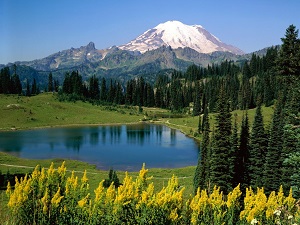Overview of Washington State
Washington is a state in the Pacific Northwest of the United States. The state is named after George Washington, the first President of the United States. As of the 2000 census, the state population was approximately 5.9 million and the state workforce numbered about 3.1 million. Residents are called "Washingtonians" (emphasis on the third syllable, pronounced as tone). It is also called Washington State when there is a need to distinguish it from Washington, D.C., the nation's capital.
Geography
Washington has the Pacific Ocean to the west; Oregon to the south (the Columbia River forming most of this border); Idaho to the east and British Columbia, Canada to the north. It is famous for its scenery and breathtaking beauty and sharp contrasts. High mountains rise above sparkling coastal waters and above both barren semi-desert and lush evergreen forests. Its coastal location and Puget Sound harbors give it a leading role in trade with Alaska, Canada, and the Pacific Rim. Puget Sound's many islands are served by the largest ferry fleet in the United States. Notable rivers in relation to the Tri-Cities are the Yakima River, Snake River, and the Columbia River.
Tri-Cities are the Yakima River, Snake River, and the Columbia River.
Washington is a land of contrasts. The deep forests of the Olympic Peninsula are among the rainiest places in the world and the only rain forests (such as the Hoh Rain Forest) in the continental United States, but the flat semi-desert that lies east of the Cascade Range stretches for long distances without a single tree. Snow-covered peaks tower above the foothills and lowlands around them. Mount Rainier, the highest mountain in the state, appears to "float" on the horizon southeast of Seattle and Tacoma on clear days. The eastern side of the state can be divided into two regions: the Okanogan Highlands and the Columbia River Basin.
Economy
The 2004 total gross state product for Washington was $262 billion, placing it 14th in the nation. The per capita income was $33,332. Significant business within the state includes the design and manufacture of jet aircraft (Boeing), computer software development (Microsoft, Amazon.com, Nintendo of America), electronics, biotechnology, aluminum production, lumber and wood products, mining, and tourism. The state has significant amounts of hydroelectric power generation. Significant amounts of trade with Asia pass through the ports of Puget Sound.
The state of Washington is one of only seven states that does not levy a personal income tax. Neither does the state collect a corporate income tax. However, Washington businesses are responsible for various other state levies. Washington's state sales tax is 6.5 percent, and it applies to services as well as products. Most foods are exempt from sales tax; however, prepared foods, dietary supplements, and soft drinks remain taxable. The combined state and local retail sales tax rates increase the taxes paid by consumers, depending on the variable local sales tax rates, generally between 8 and 9 percent. An excise tax applies to certain select products such as gasoline, cigarettes, and alcoholic beverages. Property tax was the first tax levied in the state of Washington and its collection accounts for about 30 percent of Washington's total state and local revenue. It continues to be the most important revenue source for public schools, fire protection, library, park and recreation, and other special purpose districts.
All real estate and personal property are subject to tax unless specifically exempted by law. Personal property also is taxed, although most personal property owned by individuals is exempt. Personal property tax applies to personal property used when conducting business or to other personal property not exempt by law. All property taxes are paid to the county treasurer's office where the property is located. Washington does not impose a tax on intangible assets such as bank accounts, stocks, or bonds. Neither does the state assess any tax on retirement income earned and received from another state. Washington does not collect inheritance taxes; however, the estate tax is decoupled from the federal estate tax laws, and therefore the state imposes its own estate tax. Washington is one of eighteen states which has a government monopoly on sales of alcoholic beverages, although beer and wine with less than 20 percent alcohol by volume can be purchased in convenience stores and supermarkets. Liqueurs (even if under 20 percent alcohol by volume) and spirits can only be purchased in state-run or privately-owned-state-contracted liquor stores.
Bill Gates (worth $53 billion) is the best-known billionaire in the state and the wealthiest man in the world. Other Washington state billionaires Paul Allen (Microsoft), Steve Ballmer (Microsoft), Jeffrey Bezos (Amazon), Craig McCaw (McCaw Cellular), James Jannard (Oakley), John Edson (leisure craft), Howard Schultz (Starbucks), Charles Simonyi (Microsoft).
Transportation
Washington has an extensive system of state highways, called State Routes, as well as the third-largest ferry system in the world. There are 140 public airfields in Washington, including 16 state airports owned by the Washington State Department of Transportation. Boeing Field in Seattle is the busiest airport by the number of planes in the world. The unique geography of Washington presents exceptional transportation needs.
There are extensive waterways in the midst of Washington's largest cities, including Seattle, Bellevue, Tacoma, and Olympia. The state highways incorporate an extensive network of bridges and the largest ferry system in the United States to serve transportation needs in the Puget Sound area. Washington's marine highway constitutes a fleet of twenty-eight ferries that navigate Puget Sound and its inland waterways to 20 different ports of call. Washington is home to four of the five longest floating bridges in the world: the Evergreen Point Floating Bridge, the Lacey V. Murrow Memorial Bridge and Homer M. Hadley Bridge over Lake Washington, and the Hood Canal Bridge which connects the Olympic Peninsula and Kitsap Peninsula. The Cascade Mountain Range also provides unique transportation challenges. Washington operates and maintains 7 major mountain passes and 8 minor passes. During winter months these passes are plowed, sanded, and kept safe with avalanche control. Not all are able to stay open through the winter. The North Cascades Highway on State Route 20 closes every year. Because of the extraordinary amount of snowfall and frequency of avalanches, the highway is not safe in the winter months, although the highways have a slight curve in order for the water to run off.
